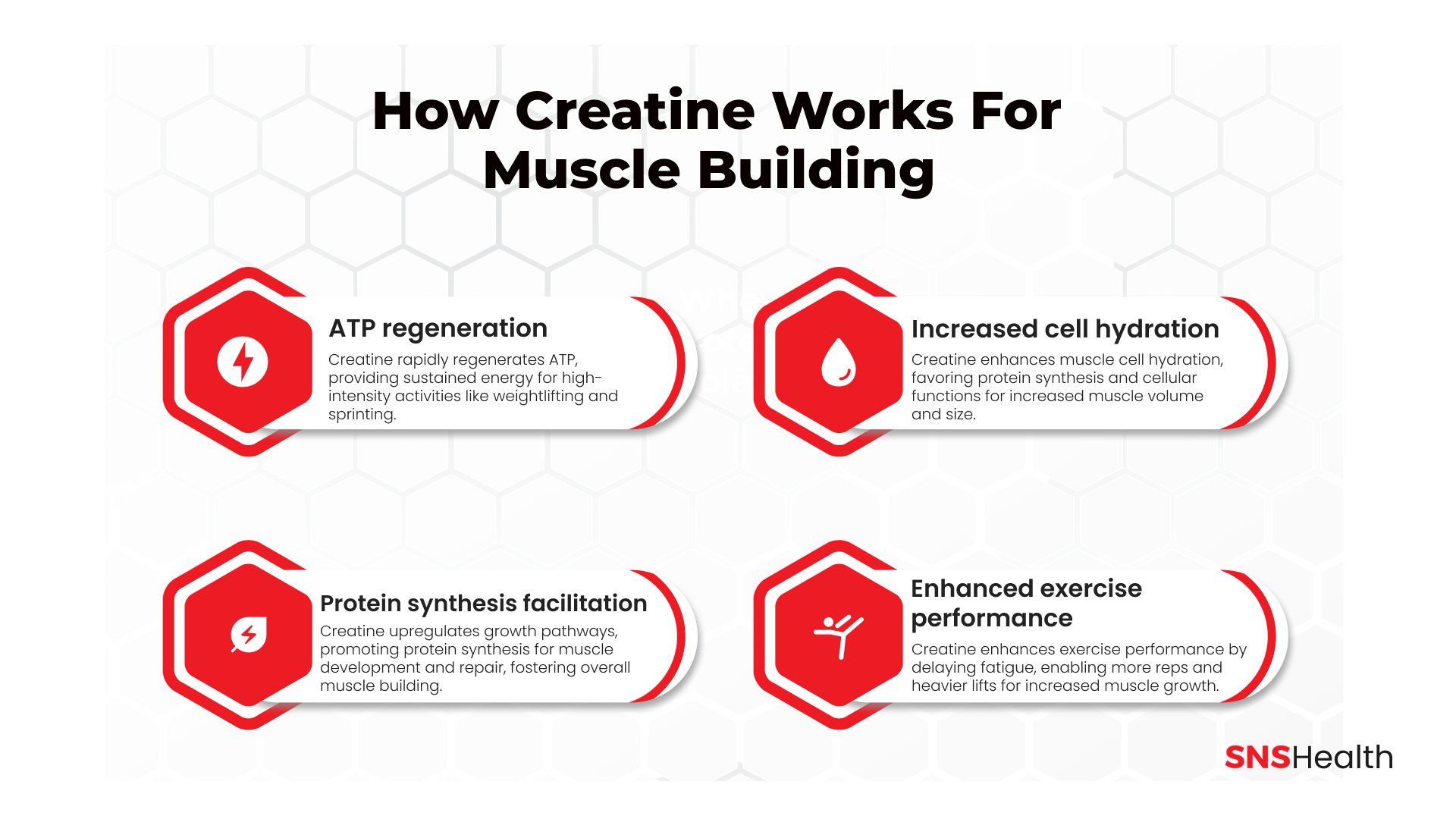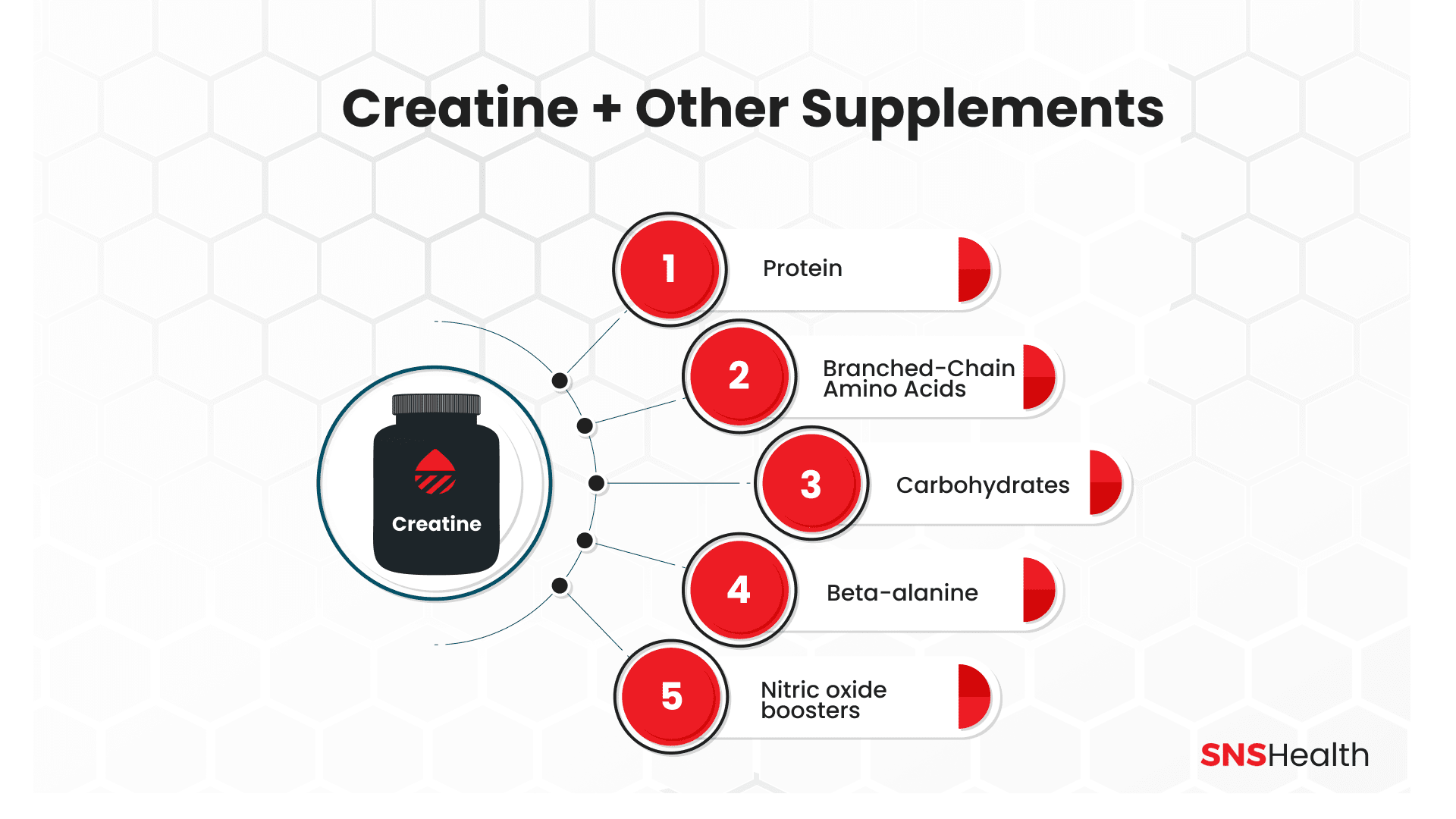Embarking on the journey of muscle building involves unlocking the potential of supplements, and at the forefront stands creatine. This naturally occurring compound sparks interest for its proven impact on strength, power, and muscle growth. Let's delve into a comprehensive guide, exploring the nuances of creatine and its role in sculpting a powerful physique.
Understanding creatine
Creatine, a naturally occurring compound in the body, plays a pivotal role in cellular energy metabolism, particularly during short bursts of intense physical activity. Synthesized in the liver, kidneys, and pancreas, creatine is stored in muscles, aiding in the rapid regeneration of adenosine triphosphate (ATP), the primary energy currency of cells. This replenishment supports increased power, strength, and endurance during high-intensity exercises.
As a key player in the phosphocreatine system, creatine's impact on muscle contraction and energy production is crucial for athletes and fitness enthusiasts. Exploring its mechanisms unveils creatine's significance in optimizing performance and promoting muscle development.
Types of creatine
Creatine supplementation comes in various forms, each claiming unique benefits. Understanding the distinctions between these types can guide users in selecting the most suitable option for their fitness goals. Here's an exploration of common creatine variants:
Creatine monohydrate: Creatine monohydrate stands as the most researched and cost-effective form. Its proven track record in improving strength and muscle mass makes it the preferred choice for many.
Jacked Factory Creatine Monohydrate, IsoPure Perfect Creatine Monohydrate, ALLMAX Creatine Powder, NOW Creatine Monohydrate Powder, are some of the best quality creatine monohydrates you will find at SNS Health.
Creatine Ethyl Ester (CEE): Marketed for enhanced absorption, CEE aims to address the potential downsides of creatine monohydrate. However, limited scientific backing raises questions about its superiority.
Creatine hydrochloride (HCL): Marketed as a more soluble alternative, HCL seeks to minimize water retention and digestive discomfort. While some users report improved tolerability, robust evidence supporting its distinct benefits is lacking.
Buffered Creatine: Developed to reduce creatine-to-creatinine conversion, buffered creatine aims to enhance stability. Despite theoretical advantages, empirical evidence supporting its superiority still needs to be conclusive.
Micronized Creatine: With smaller particle sizes for improved dissolution, micronized creatine aims to enhance absorption. While anecdotal evidence suggests easier mixing, its impact on performance remains comparable to creatine monohydrate.
At SNS Health we have a wide range collection of micronized creatine supplements such as Optimum Nutrition Micronized Creatine Capsules, Warrior Micronised Creatine Monohydrate, and many more.
How creatine works for muscle building

Creatine, a natural compound synthesized in the body, plays a pivotal role in augmenting muscle growth and strength through its impact on cellular energy processes.
- ATP regeneration: Creatine functions as a rapid ATP regenerator during short bursts of high-intensity exercise. By donating phosphate groups, it aids in the resynthesis of adenosine triphosphate (ATP), the primary energy currency of cells. This supports sustained energy for activities like weightlifting and sprinting.
- Increased cell hydration: Creatine promotes muscle cell hydration by drawing water into the cells. This increased water content creates a more favorable environment for protein synthesis and cellular functions, contributing to muscle volume and size.
- Enhanced exercise performance: With heightened ATP availability, creatine enhances exercise performance by delaying fatigue. This allows individuals to push through more reps or lift heavier weights during resistance training, stimulating greater muscle growth over time.
- Protein synthesis facilitation: Creatine has been linked to an upregulation of certain growth-promoting pathways, facilitating protein synthesis. This, in turn, contributes to the development and repair of muscle tissues, fostering overall muscle building.
Benefits of creatine for muscle building
Creatine, celebrated for its efficacy, offers a myriad of advantages for individuals seeking to maximize their muscle-building potential.
- Improved strength and power: Creatine enhances high-intensity, short-duration activities by replenishing ATP stores. This results in increased strength and power, allowing for more robust and effective workouts.
- Increased muscle mass: By promoting cell hydration and supporting protein synthesis, creatine contributes to an increase in muscle volume. This effect is particularly valuable for individuals striving to build lean muscle mass.
- Enhanced exercise performance: Creatine's ability to augment ATP regeneration translates to improved exercise performance. Athletes experience delayed fatigue, enabling them to sustain higher workloads during training sessions.
- Accelerated recovery: Creatine has been linked to a reduction in muscle damage and inflammation, expediting the recovery process. This enables individuals to train more frequently and with higher intensity, fostering continuous muscle growth.
- Reduction in muscle soreness: Users often report a decrease in post-exercise muscle soreness with creatine supplementation. This allows for quicker recovery between workouts, facilitating consistent training and muscle-building efforts.
- Cognitive benefits: Emerging research suggests that creatine may have cognitive benefits, positively impacting brain function. This can indirectly support muscle building by promoting focus and mental resilience during challenging workouts.
Creatine dosage and timing
To harness the full benefits of creatine for muscle building, understanding the appropriate dosage and timing is crucial.
Loading phase: While not mandatory, a loading phase of 20 grams per day (divided into 4 doses) for 5-7 days saturates muscle stores more rapidly. This can be beneficial for those seeking immediate results.
Maintenance phase: Following the loading phase, a maintenance dose of 3-5 grams per day is typically sufficient. This sustains elevated creatine levels in the muscles over the long term, supporting ongoing performance and muscle-building efforts.
Timing around workouts: Consuming creatine around your workout window is often recommended. Pre-workout supplementation ensures elevated creatine levels during exercise, while post-workout intake aids in replenishing depleted stores, fostering recovery.
Combining with carbohydrates: Enhance creatine absorption by pairing it with carbohydrates. Insulin, released in response to carbohydrates, facilitates creatine uptake by muscle cells, maximizing its effectiveness.
Consider individual factors: Individual responses to creatine vary. Factors like body weight, muscle mass, and metabolism should be considered when determining the optimal dosage. Consulting with a healthcare professional or a fitness expert can provide personalized recommendations.
Hydration: Adequate water intake is crucial when using creatine, especially during the loading phase. This helps maintain hydration balance as creatine draws water into the muscles.
Safety and side effects
Creatine is generally recognized as safe and well-tolerated, but like any supplement, it's important to be aware of potential side effects and ensure responsible usage.
Hydration importance: Adequate water intake counters mild water retention commonly associated with creatine use.
Gastrointestinal sensitivity: Some may experience minor bloating; adjusting dosage or choosing a different form can alleviate discomfort.
Kidney health: Generally safe for healthy kidneys, but those with kidney conditions should consult a healthcare professional.
Purity matters: Choose high-quality creatine products to avoid contaminants and ensure safety.
Drug interactions: Check for potential interactions with medications, seeking advice from a healthcare provider if needed.
Individual response: Responses vary; attentive self-monitoring allows for adjustment or discontinuation if adverse effects occur.
Short-term safety: Short and medium-term use is well-supported, but long-term effects require further study, emphasizing the importance of moderation.
Who should and shouldn’t take creatine
Creatine is a widely studied and safe supplement, but its suitability varies among individuals.
Who should consider creatine:
- Athletes and fitness enthusiasts: Creatine is beneficial for individuals engaged in high-intensity training, promoting enhanced performance and muscle growth.
- Vegetarians and vegans: As creatine is found predominantly in animal products, individuals following plant-based diets may benefit from supplementation.
- Those seeking strength gains: If strength and power improvement is a fitness goal, creatine supplementation can aid in achieving these objectives.
- Adults with healthy kidneys: For individuals with healthy kidneys, creatine is generally safe and well-tolerated.
Who should exercise caution or avoid creatine:
- Individuals with kidney conditions: Those with pre-existing kidney issues should consult a healthcare professional before using creatine, as it may affect kidney function.
- Under 18 and pregnant/breastfeeding women: While safety research is limited, caution is advised for those under 18 and pregnant or breastfeeding women due to potential unknown risks.
- Individuals on medications: Creatine may interact with certain medications, warranting consultation with a healthcare provider before supplementation.
- Those sensitive to gastrointestinal issues: Individuals prone to gastrointestinal discomfort may experience mild bloating; adjusting dosage or considering alternative forms may help.
Combining creatine with other supplements

The strategic combination of creatine with complementary supplements can amplify overall fitness benefits, offering a synergistic approach to muscle building and performance optimization.
Protein
Creatine pairs seamlessly with protein supplements. Protein provides essential amino acids crucial for muscle repair and growth, while creatine enhances energy production during workouts. This combination promotes anabolic processes for enhanced muscle development.
At SNS Health you get to choose from top-branded protein powders like whey protein concentrate, whey protein blend, whey protein isolate, whey protein hydrolysate, mass gainers, casein, and vegan protein.
Branched-Chain Amino Acids (BCAAs)
BCAAs, especially leucine, play a pivotal role in muscle protein synthesis. Combining BCAAs with creatine supports the intricate processes of muscle repair and growth, fostering a conducive environment for optimal results.
SNS Health has the best collection of BCAA supplements including Mutant BCAA 9.7, ALLMAX Aminocore, Ghost BCAA, Perfect Sports BCAA Hyper Clear, and more.
Carbohydrates
Creatine uptake is facilitated by insulin release, which is stimulated by carbohydrates. Consuming creatine with a carbohydrate source, particularly post-workout, can enhance its absorption, ensuring it reaches muscle cells efficiently.
Beta-alanine
Beta-alanine complements creatine by improving endurance through increased buffering of lactic acid. Together, they enhance overall workout capacity, delaying fatigue and supporting extended training sessions.
ALLMAX Beta-Alanine, Jacked Factory Nitrosurge are some of the beta-alanine supplements you will find at SNS Health.
Nitric oxide boosters
Creatine synergizes with nitric oxide (NO) boosters like citrulline malate, promoting vasodilation. This combination enhances blood flow, nutrient delivery, and oxygen supply to muscles, optimizing performance and recovery.
Conclusion
In conclusion, creatine stands as a cornerstone in the realm of muscle building, offering a safe and effective avenue for enhanced strength, power, and recovery. Its versatility and compatibility with various supplements provide individuals with a tailored approach to optimizing their fitness journey. Always consult with professionals for personalized advice and safe integration.








